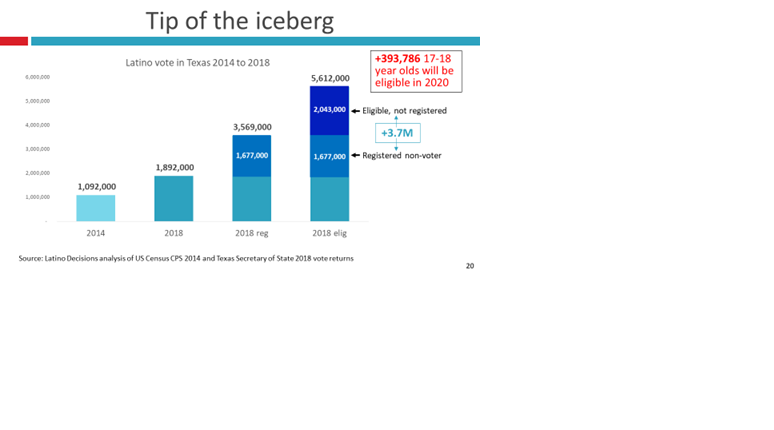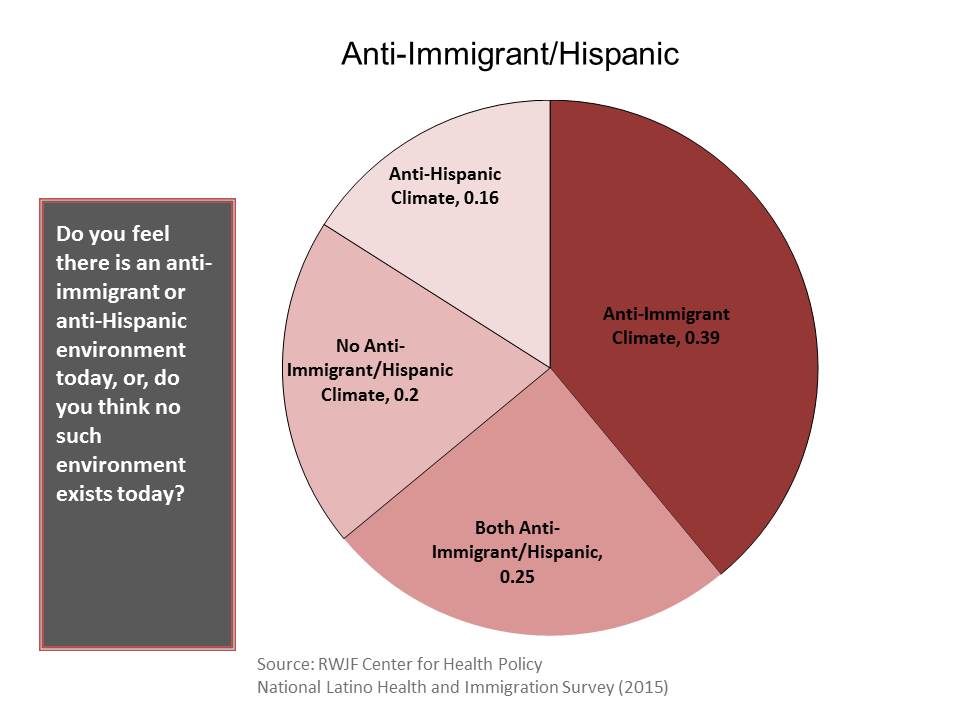On a press call and webinar held this morning, Latino Decisions presented the findings of its groundbreaking national poll on Latinos’ health, experiences with the changing healthcare marketplace, and outlook on immigration and racial issues. Sponsored by the Robert Wood Johnson Foundation (RWJF) Center for Health Policy at the University of New Mexico and conducted by Latino Decisions, the National Latino Health and Immigration Survey provides the most in-depth views to date on Latinos’ experiences with the Affordable Care Act (ACA) in the five years since its passage.
**TOPLINE RESULTS HERE** **SLIDE DECK HERE**
Gabriel Sanchez, PhD, Executive Director of the RWJF Center for Health Policy at the University of New Mexico and Director of Research at Latino Decisions, said, “This new survey provides an important overview of the Affordable Care Act’s impact on the Latino population after two years of open enrollment. We find that 82% of Latinos currently have health insurance, which is the highest rate of coverage we have recorded since we began polling in this area back in 2008. That said, many Latinos reported experiencing problems while attempting to enroll through the state and federal exchanges, and a sizable percentage of Latinos also indicated that they did not enroll in health care due to the costs.”
- The ACA has decreased the percentage of Latinos who are lacking health insurance coverage. The poll found that only 17% of Latinos lack health insurance in this poll, compared to 28% in a Latino Decisions poll in 2013.
- There exists a significant gap in health coverage based on nativity, with 87% of U.S.-born Latinos indicating that they are covered but only 78% of foreign-born Latinos
The survey also asked Latinos about their perceptions of the ACA and their experiences with the marketplaces and exchanges. Below are a few of the main findings in this set of items:
- Outreach to Latinos remains a problem: Even after two years of being live and despite all of the outreach efforts the Obama administration has engaged in, 25% of Latinos in indicated that they actually heard “nothing at all” about the health insurance marketplaces, and another 28% indicated that they had heard “not that much” about the marketplaces or exchanges.
- Enrollment challenges: While 29% of Latinos utilized the federal or state websites or phone numbers to get more information about the new health insurance options during the open enrollment period last year, only 35% of these individuals were able to enroll “easily”. Another 18% eventually were able to enroll but experienced problems, 21% experienced problems that prevented them from enrolling, and another 10% indicated that they either could not understand the information on how to enroll or found the options too expensive.
- Cost of insurance an issue for some: While the vast majority of Latinos who did not sign up for health insurance through the exchanges indicated that they were already insured and satisfied with their current coverage, 12% stated that they did not enroll because it was “too expensive” or that they would rather pay the fine. This indicates that costs of insurance remain a problem for over 1 in 10 Latinos.
- Views of personal healthcare situation: While 77% of Latinos think that their ability to get and keep health insurance will at least stay the same (33% better), as well as see the quality of their health care stay the same or get better (almost identical numbers). When we look at the cost of health care, nearly a third (29%) say that things will actually get worse from them under the ACA. Similar to our polls in the past, cost remains the most salient issue to Latinos regarding health care.
The survey also gauged Latinos’ daily experiences and outlook on issues related to race and immigration:
- Majority of Latinos know an undocumented immigrant: 61% of Latinos, regardless of citizenship status, reported knowing someone that is undocumented. Additionally, 36% of Latinos know someone that has been detained and/or deported, and 46% of all Latinos worry that a friend or family detained or deported due to their immigration status.
Eduardo Vargas, PhD, Post-doctoral Scholar, School of Medicine and Public Health, University of Wisconsin-Madison, said that “These are alarming numbers, given that many respondents reported that the undocumented immigrants they know are family and relatives. Surprisingly, we found that U.S. born Latinos are a little more likely to know a deportee.”
Francisco Pedraza, PhD, Assistant Professor of Political Science, Texas A&M University, and former Fellow of the RWJF Scholars in Health Policy Research Program, noted, “One of the most concerning narratives about the state of life in Latino America is the extent to which some are ‘living in the shadows.’ We found that 1-in-3 Latinos are holding back in some form from full engagement in public life in order to avoid scrutiny of their citizenship status. This includes avoiding reporting crimes to police, meeting with school officials, and making appointments with healthcare providers.” Additional findings include:
- Majority view their states’ policies as favorable to immigrants: In measuring Latinos views towards their states’ policies towards immigrants, the survey found that 53% described their state policies as “favorable” to immigrants, while 38% of respondents felt their state had policies that were “unfavorable” towards immigrants.
- Vast majority report existence of “anti-immigrant” and “anti-Hispanic” sentiments: A combined 78% of respondents said that anti-immigrant or anti-Hispanic attitudes existed, with 40% of respondents saying there was “definitely” an anti-Hispanic and anti-immigrant environment and an additional 38% saying there was “somewhat” of an anti-Hispanic and anti-immigrant environment. Only 18% reported that no such environment existed. Further, the majority of respondents (52%) said the environment was both anti-immigrant and anti-Hispanic, while 25% said it was mostly anti-immigrant and 16% said it was mostly anti-Hispanic.
The telephone poll of 1,005 Latino adults in the United States was fielded January 29-March 12 2015 via live-calls (not robo/IVR), and carries a margin of error of plus or minus 3.1 percentage points.
- Access the topline results from the National Latino Health and Immigration Survey: Topline Results Latino National Health Survey
- Access a copy of the presentation from today’s webinar: RWJF_UNM_Presentation_Deck_2015
- Listen to a recording from today’s call here: https://www.dropbox.com/s/5yufv7pefaunf6r/LATINOHEALTH%20032515.mp3?dl=0


